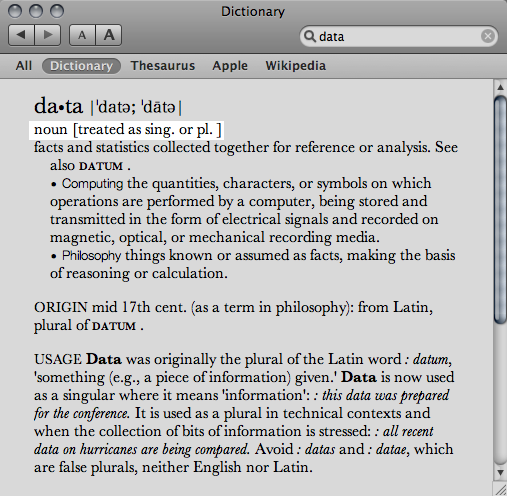I was editing a blog post at work the other day – it may surprise you to learn that writing this blog is not my job – and I amended “the data says” to “the data say” because as everybody pedant knows, “data” is the plural of “datum.” I didn’t think much more about it.
Then somebody “corrected” me and said it was wrong. I fired back some citation or other and didn’t think much more about it.
Then a consultant making a pitch for our business chided us in his pitch presentation on our lousy grammar by citing that very post. (Dear consultant guy: 1. you really should make sure your client is unambiguously in the wrong, and 2. there’s a sentence fragment in the middle of your own blog post on the subject of grammar. At least we agree that grammar counts.)
Every geometer knows that two points determine a line, and now – counting the original author – I had at least two smart people saying that data should take a singular verb. I needed to think more about this.
There’s plenty of evidence that I was right to write “the data say” but also plenty that “the data says” is not wrong. The estimable Grammar Girl has a good blog post that begins by complicating things – it’s not about data being singular or plural; it’s about data being or not being a mass noun – and ends with some good guidance about picking your path and sticking to it.

I’ve come around to a different idea. Using a possibly controversial construction is a no-win situation. You either earn points with antiquarian scholars and sound overwrought, or you please the crowd and sound dull to the nitpicky. It’s a bit like the forcefully correct use of “whom.” Either way you risk some people thinking you’re careless or ignorant. If you’re got a sentence, especially a headline or title, that forces the reader to think about whether a word in it is right or wrong, I think it’s time to choose a different word or write a different sentence.
Perhaps instead of
…the data say… or …the data says…
we might try
…the survey says… or …my research reveals… or …4 out of 5 dentists agree…
Have I given in to the forces of the incorrect by avoiding the issue? I hope not. I don’t suggest anybody stop correcting errors of “you’re” vs “your” or allowing “alot” to slide by for “a lot” but when there’s room for common usage to differ from correct usage or where usage is evolving, making your readers think about grammar instead of reading and digesting your point is a bad idea.

As a scientist in the pharmaceutical industry, my business life is all about data. I write about data constantly and hence, use the word “data” quite frequently. Let me assure you that data is a plural word, and that the correct use is “data are”; few things grate on the nerves like “data is.”
I’m not just a pedant – you can practically hear the groans from half the room at any large conference or presentation when some junior scientist uses “data is.” Fingernails on the chalkboard.
Don’t support the dumbing down of the English language. Just because most people say “ain’t” does not mean it has suddenly become correct, or even desirable, vocabulary.
Hi Kaela
Thanks for writing, but I think you miss my point. I started off being concerned about accuracy and correctness, like you are, but I ended up mre concerned about clarity and communicating my point. So I would never advocate using incorrect language, but in the cases where the correct language could cause a problem, I say choose different correct language.
Since you’re a professional and talking about speaking to an audience of professionals, you’ve got the high ground in using the right words in that setting. When I write for a general audience, I have to steer clear of language that is correct but might distract some of my readers from getting the point that I’m making.
isn’t there a chapter in the tipping point about language? specifically, that when enough people commit an etymological sin, it becomes less sinful, and sometimes even the new rule. sort of like saying mass in english.
I’d like to get a ruling from kaela on the use of myriad as a noun. talk about fingernails on a chalkboard. and dictionary editors caving to popular misuse…